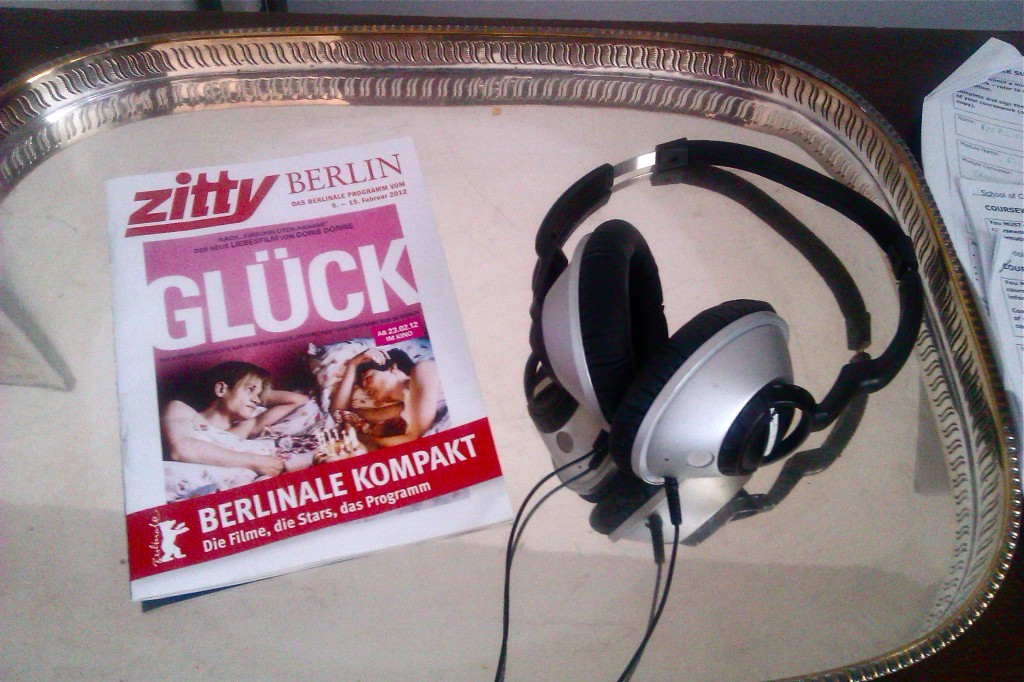How to Survive the Berlinale (the Berlin Film Festival)
Potsdamer Platz is suddenly teeming with people. There isn’t the density of midtown Manhattan but, restrict your peripheral vision, you might be fooled. The rush is comforting for many festival participants, because Berlin’s so confusing in its urbanism: it’s so cool, we’ve heard so much about it, but when we get off the subway at Beusselstraße there’s nobody around. Just the sound of wind and the cold. It makes one feel very alone, it could provoke an existential crisis. What am I doing with my life? Am I a great filmmaker?
For Berliners, inured to the city’s vastness, there are different concerns about the festival. Two of the most common complaints about the Berlinale are: 1. the atmosphere of aggressive networking that suddenly descends on the city, and 2. the difficulty in obtaining tickets. I have solutions for both problems, but you might need to choose one over the other.
WHAT CAN YOU DO FOR ME?
At the Berlinale conversations change. Not just in the producers’ lounge, but over coffees in the Arkaden you hear:
‘My début film was successfully marketed by XYZ, I have a new project. Would you know so and so–‘
‘I’ve met so and so, he was instrumental in my highly successful ABC’.
‘I saw your ABC at Sundance, I knew it would be highly successful. Actually, it was an inspiration for XYZ’.
‘Let me give you my card’.
‘Here’s mine. Maybe we can collaborate with so and so on MNO’.
‘Sure, I just love your work’.
I don’t know about you, but at this point, I am running to the M41 bus wondering how deep in non-corporate Neukölln I can bury myself.
Or perhaps all those festival mascots, the ceramic bears in threatening poses lurking in the Sony Centre, will suddenly experience an Ovidian transformation, and, Actaeon-style, tear these glad-handers to pieces. I am ashamed by the allusion, lower my head, and just count myself lucky that the hound-race of self-promotion isn’t something I encounter too often in Berlin.
I met an acquaintance from Los Angeles who explained how LA is networking-central, it makes meeting ‘real’ friends difficult. Her fellow Angelenos are in culture shock when Berliners have a conversation with you, then don’t give you give their business card, don’t wonder how you’re ‘useful’, and just say ‘I enjoyed talking with you, goodbye’.
Or perhaps often it’s just done differently in Berlin, with the same intent to instrumentalise, but with more subtle signals: a friendly beer, a careful effort to pretend it isn’t about ‘needing you’, and then a careful proposal. Festivals after all are places to meet people and to get work. And creative people know just how hard that can be. It’s presumptuous and wrong for the public to see the event as social and not professional. It’s a trade fair, and we get distracted if we think the goods are there for our amusement.
SURVIVAL TIP #1: For the public: headphones. For the entire festival, except when you are in a film, where the soundtrack is included in the ticket price.
TICKET ATTACK
I wander downstairs in the Arkaden to the ticket desks. The lines are very long. Getting tickets is difficult, even for participants who also need to obtain them in advance. For the public they are released only 3 days before at 10am, both online and at the ticket points (where more are available). Anyone who has been at their computer at 10am to buy tickets is astonished at how the tickets evaporate in a matter or a minute or two. It’s a virtual piranha attack. But I still prefer it to the sleeping bag on a mall’s floor.
(Note that even if all the online tickets are apparently ‘sold’ in a matter of minutes, on the day of the film itself you just might frustratingly find half the theatre empty…go figure. I think there are many creases in festival logistics in determining how many tickets should be made available to the public and how many reserved for participants, and when remainders should be put on sale).
Another common complaint at the festival is that since most of the films have not been shown before, and there is nothing in the way of online reviews, it’s a crap shoot when it comes to choosing. Last year I clicked randomly at whatever I could get that fit a schedule and, after seeing many many bad movies (‘but that’s what Berlinale is all about, the experience of the festival, not the quality of the films!’ says a friend), I promised myself that this year I would avoid the festival and simply see films that are good in the regular theatres.
But there’s something about Berlinale that sweeps you up, the buzz, and after days of refusing to participate, I finally will have my full movie day tomorrow. And I admit I’ve tried to keep my ear to the ground, and listen to the chatter of participants, but it complicates my compliance with Survival Tip #1.
SURVIVAL TIP #2: Plan better and go by word of mouth, leave your headphones at home. Listen to the buzz, embrace the atmosphere of exchanged favours. Maybe someone will scratch your back somewhere it needs it? Choose all your films in advance, wait poised at your computer at 10am sharp, and have speedy fingers. (I’ve heard that the Ambramovic´ film, ‘The Artist is Present’, for example, is a winner. I’ll see on Saturday, if the fish don’t eat all the tickets). And then when it’s all over and the marketers, producers and big-money people have gone home, count your lucky stars that Berlin still has that atmosphere of non-competitive exchange, as the folks at Slow Berlin put it… for now.


